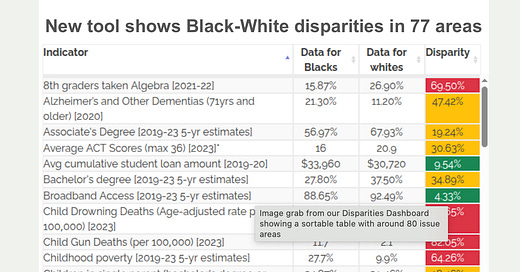Othering and Belonging at University of CA at Berkeley has a new and expanded Racial Disparities Dashboard with 77 indicators measuring Black-White disparities. It covers education, criminal justice enforcement, employment, health and more. The dashboard was launched two years ago and becomes more relevant by the day. Here’s the website.
Below is just a sample of what you can find.
You can see where the disparities are and the impact of not having good internet, role models, and too many guns. The negative health impacts of racism have been known for a while and are vividly illustrated here. There must be some mistake on single parent bachelor’s degree because the numbers don’t add up.
With the deliberate attacks on all people of color and attempts to embed white supremacy, things will only get worse. But sometimes I feel like I must be from some other century. One of the strategies suggested to address this problem is called “Targeted Univeralism” that means a framework that sets universal goals but uses targeted strategies based on the circumstances of different groups to help them reach the goal. Isn’t that what we always did or should have been doing?
In my elementary school, those of us who were better readers were shuffled off to do other things while the teacher worked with the slow readers. In middle school (it wasn’t called that then), we had a reading/comprehension program where you went at your own speed and advanced to the purple level on your own. We read it, tested, scored, and if we did high enough, we went on to the next color. If not, we stayed in the same color and got help from the teacher. My 8thgrade teacher also made a separate group of the kids who were destined for college, and we read the classics (Farenheit 451, Animal Farm, Big Brother) and discussed them.
To tell you what a good teacher he was, when I said I wanted to be a diplomat he said, “Dianne, your personality is not suited for that. Try something else.” He was 100% right.
I just read an article in Mother Jones about juvenile girls and eliminating courts by listening to what girls need. Isn’t that what we always should have been doing? When I was a parole officer in Indio, CA, and some kid was going to be released from Youth Authority to my area, I went to the prison and met with the kid before s/he came back to find out their plan and what I needed to do to make sure they had a plan when they got out. That seemed like a most sensible idea to me.
After about 6 months, I was prohibited from going to the prison and meeting them before release. The rationale was that while they were in prison, they were the property of the prison, and I had no business coming there to interfere. That made about as much sense to me as chickens playing chess but at 22, who was I to argue – though I did. So I started writing to them. They couldn’t prohibit that. In 12 months, I was fired for failing my probation period because few of my kids went back to jail but one who dropped her purse filled with drugs at the Mexican border, and one who holed up in her parent’s cabin with her boyfriend and traded shots with police officers. I was told that the prison guard union needed more kids in prison, or they were going to be laid off so I should send some kids back. That didn’t go over well.
Recently I read a study about prohibiting cell phone usage for a month – the kids got flip phones for emergency and talking. That’s it. Dozens of factors improved from their grades to their mental health. A friend recently told me her 8-year-old granddaughter said, “why do I have to learn to read? I can just look it up on google.”
Am I a dinosaur or was my education better? The school I went to just recently won again in the statewide ranking of small schools in poverty areas that produce high-performing kids – an honor they have won for decades. So yes, target your approaches to the kid, listen to the kid – seems elemental to me.






I always learn something new about you 😌.